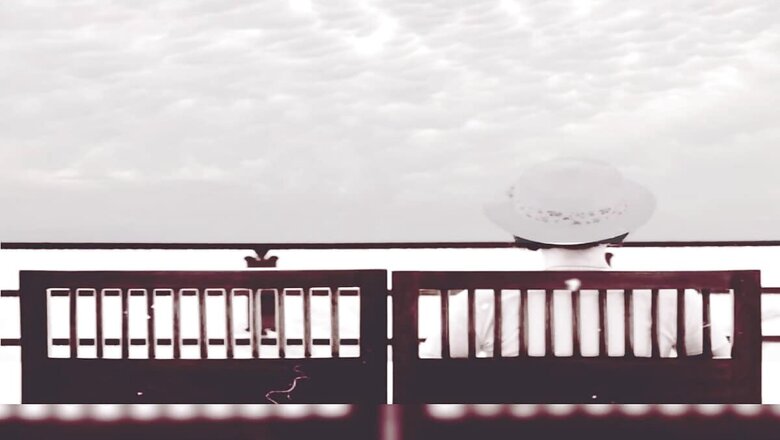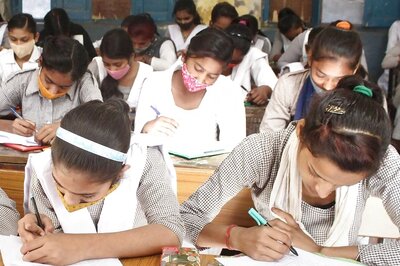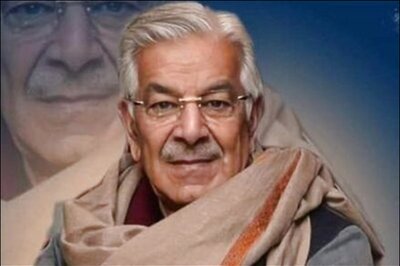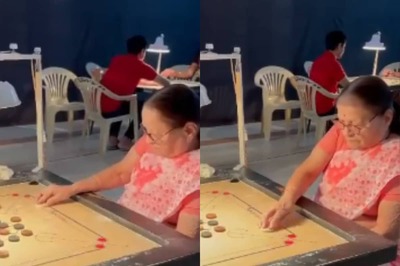
views
The pandemic was always supposed to be rough for the elderly. It has, however, turned out to be tougher for the ones who were spared.
Shakti Das, 72, has not stepped out of his house in Kolkata ever since nationwide lockdown was imposed in the country, exactly a year back. He could not even attend his wife’s funeral.
Das has lost interest in eating, sleeping and talking to his children. He is convinced that it should have been him and not his wife. “Why did I survive?” he constantly murmurs, while sitting in his room’s balcony in an old lungi and kurta, staring blankly at passersby.
In the second week of November last year, Das’s wife, Suchismita, had caught a fever. The family decided to wait before getting her tested. “None of us had stepped out since the lockdown. We thought there was no way she could have been infected by coronavirus,” her son explains.
However, a couple of days later, her oxygen level started dipping. She was immediately admitted to a nearby hospital. After being tested positive for Covid-19, the 68-year-old was put on ventilator.
Meanwhile, Das sat bundled up in layers of sheets inside his room, praying for his wife to come home. Three days later, Suchismita could not survive. Due to state restrictions and health risks, Das couldn’t be a part of her last rites.
For weeks after, Das would go through old medical reports of his wife in an attempt to decipher what was wrong with her. “He often told me to go back to the hospital and ask doctors why she couldn’t pull through. At times he would even shout that there must be something wrong in the way they treated her,” says his son.
Das’s doubts, even if not true, were not completely unfounded. Medical reports of the couple said that it was he who suffered mild intermittent asthma, was a smoker till he retired and had a weaker immunity than his wife. Suchismita, on the other hand, was diagnosed with diabetes years back.
These along with a more positive and satisfying outlook his wife had towards life have led him to believe that there can be justification for his survival.
Inside his room, there is a thick layer of dust on his reading glasses. For the last 51 years and more so after his retirement, Das was used to being handed morning tea, along with his glasses and newspaper by his wife. Now, his son gets him the morning daily but Das has stopped reading.
The South Kolkata-bred erstwhile government officer now walks with a stoop is hardly able to sleep and dislikes company. Life for him is an everyday repetition of spending the entire waking hours on the balcony while his children try to convince him to eat.
“Like most Bengali households, my father used to enjoy having fish. For the last four months, he has been surviving on pulses and rice. He refuses to eat anything else,” says his son.
The death of a spouse is in itself a mental health catastrophe. In addition to that, what Das and many others like him are going through is popularly being termed as the survivor’s guilt.
Survivor’s guilt has conventionally been used in the context of post-traumatic stress disorder (PTSD). It was first observed among those who made it through the Holocaust. Many of them reported feeling guilt for surviving the catastrophe while their friends and family could not.
The condition typically occurs when an individual goes through a traumatic experience but concludes that they were somehow undeserving of survival or that someone else would have been more deserving. The feeling is similar in the case of the pandemic.
For 68-year-old Ramesh Chandran, the trauma included getting infected by the virus and surviving only to see his brother succumb. On 14 December last year, Chandran and his brother were tested positive in Uttar Pradesh’s Noida and were asked to get admitted.
While Chandran was kept in the normal covid-19 ward, his elder brother was taken to ICU. Doctors said his oxygen levels were fluctuating and that he needed external administering. Within a week, he was declared dead.
The family decided not to divulge the news to Chandran. Eight days later, when he returned home, free from the virus, the folks took another two days to break it to him.
“He was shocked. His blood pressure dropped and he went completely numb. We had to call our family doctor immediately. We had told him that my uncle was still in the hospital. The family did not know how to react. We were happy for my father but still in a state of shock about my uncle passing away,” says Chandran’s son.
Three and a half months later, the retired engineer blames himself for his elder brother’s death. “He does not leave his room anymore. He hardly eats and thinks that he was the carrier because of his which my uncle got infected,” adds his son.
Chandra has been a widower for the last five years. Now, with his brother gone, he has become extremely lonely. He has stopped receiving phone calls. Rarely, when he answers his friends he is heard sobbing and complaining that he is responsible for the tragedy.
The family has tried taking him to a therapist but he denies any help.
Debanjan Banerjee, Department of Psychiatry, National Institute of Mental Health and Neurosciences, in his paper titled: ‘Age and ageism in COVID-19’: Elderly mental health-care vulnerabilities and needs writes, “The uncertainty and fear of the pandemic can have increased effect on the minds of the aged, as they are aware of their vulnerability. The fear of death stays lost in the existential fear of losing their loved ones and the guilt of possibly being the carriers of the infection. This can lead to self-neglect.”
Earlier this week, the Union Health Ministry said that people aged 45 and above account for about 88 per cent of all covid-19 deaths in India. The numbers get further skewed for citizens above the age of 60. A back of the envelope calculation says that roughly 50,000 senior citizens may have lost their lives due to coronavirus in the country. Therefore, it can well be ascertained how massive the mental health catastrophe is for India’s elderly.
The New York Times in December last year reported that Covid-19 survivors in Bergamo, Italy, one of the world’s hardest-hit towns, have experienced this on a widespread basis. Some people have reported a type of survivor guilt when they have been vaccinated, with many wondering why they pulled through.
David Chesire, Associate Professor, College of Medicine, University of Florida and Mark S McIntosh, Associate Professor of Emergency Medicine, University of Florida last week wrote for The Conversation stating, “Survivor’s guilt can affect up to 90 percent of survivors of traumatic events. Guilt also happens when family members can’t visit loved ones undergoing treatment at a hospital, or when someone with covid-19 survives but reads about an infected stranger who died. It can also occur when people lose loved ones due to a traumatic event, or when they themselves experienced the threat but survived it.”
Interestingly, in India, the guilt has an added reason: hospitable bills. Among those cured, some have had to pay whopping amounts leading to borrowing and erosion of lifelong savings. Also, in the case of senior citizens, because they are mostly not directly involved in earning, witnessing their children bear the expenses is causing further distress.
In the case of Shalini Sinha, 61, the private hospital she was admitted to, handed her son a total bill of Rs 12 lakhs for her covid-19 treatment. Her husband is a retired private employee and is liable to no pension. The entire amount was paid by her son.
“He had to take loans from his friends for my treatment. My oxygen level was falling and therefore I had to be taken to the nearest hospital. There was no time for finding a government counterpart. Now he is working over-time, not buying things for himself and is slowly repaying the money to his friends. What wrong has he done to face all of this?” says Shalini. The housewife resides with her family in Uttar Pradesh’s Ghaziabad.
While most insurance companies are bearing a maximum of Rs 18,000 per day, ICU critical treatment costs charged by private hospitals in major cities are anywhere between Rs 50,000 to Rs 1,00,000 a day.
Despite price caps by various state governments on the treatment for covid-19, private hospitals are charging additionally for Personal Protection Equipment (PPE), interventional procedures like bronchoscopy, biopsy, and pleural tapping, administration of high-end drugs, and high-end investigations like CT-Scan, MRI and PET scan.
To the expenses into context, as per the findings of the latest Household Expenditure Report published by the National Statistical Office, the monthly spending per person in India in more than 80 percent of the families is between Rs 5,000 – Rs 25,000 for a family of five. However, the cost of an isolation bed in a non-accredited hospital is more than three times the monthly spending.
Moreover, according to data from the National Sample Survey, 2018, up to 80.9 per cent of people in urban India and 85.9 per cent in rural India do not have any health expenditure coverage.
Therefore, a year after Prime Minister Narendra Modi announced the imposition of a nation-wide lockdown to curb the spread of coronavirus, there is a pandemic of despair awaiting India’s elderly who survived the catastrophe but are not exactly thankful for it.
Read all the Latest News, Breaking News and Coronavirus News here



















Comments
0 comment